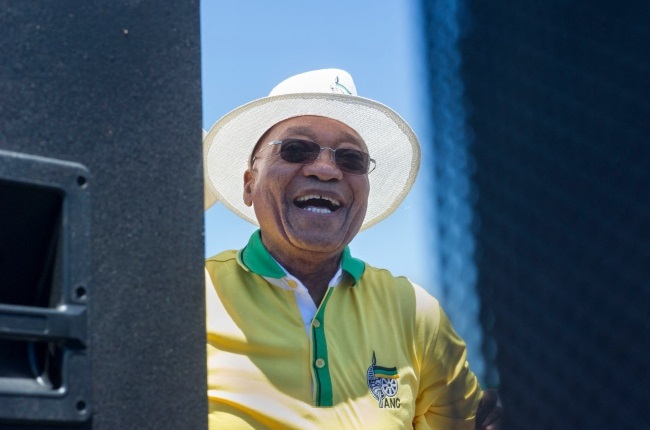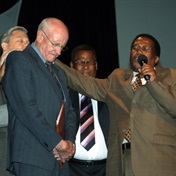
He slowly lifts his cleanshaven head from his prepared speech, carefully adjusts his spectacles and scans the more than 3 000 delegates before saying, “We have got to change gears because our gears have been wobbling.”
President Jacob Zuma receives deafening applause as he concludes the fourth ANC policy conference recently held at the posh Gallagher Estate in Midrand.
This comes as the party prepares for the all-important national conference in Mangaung in December. Zuma seems oblivious to earlier scenes when a small-scale fight erupted during an economic plenary session, which underscores how fractious the party has become below a surface of apparent unity.
The fight started when National Executive Committee (NEC) member Enoch Godongwana presented a much-vaunted report about state intervention in the economy – especially in mining. Once he had made his presentation representatives from several provinces – including Gauteng, Limpopo and North West – voiced their dissent. The debate became increasingly heated and delegates eventually came to blows. The situation had to be brought under control by security officials.
As the conference – which cost a whopping R40 million for the venue, accommodation of guests, meals and transport – comes to an end, questions are asked about whether the four-day sitting achieved all its objectives.
And whether the party will meet the aspirations of the majority of people and lay a foundation for future generations?
As the fleet of petrol-guzzling luxury German SUVs, buses and taxis prepare to ferry delegates from the venue back to far-flung corners of the country, others ask whether the oldest liberation movement in Africa has missed a crucial opportunity to lead the country towards ending economic inequalities.
As if to parody the party’s sluggish success in this area, delegates have to wait for six hours for Zuma’s closing speech. To fill in the time, young delegates chant a popular struggle song, Shona Malanga, but with a twist. They have added “Sodibana e Mangaung (shorten the days until we meet again in Mangaung) ”–a direct attack on Zuma’s aspirations for a second term as president of the ANC, and the country.
Zuma’s backers are also in full cry, singing, “Soba dubula nga mavolovolo abashisa i skibha sikaZuma (If you burn a T-shirt with Zuma’s face on it you will get a bullet).” It’s a dire warning to anyone who disrespects Zuma.
Through the years, the ANC has had major conferences that have redefined its role in society. These include the founding conference of 1912; the 1949 conference which adopted the militant Programme of Action; the 1969 Morogoro conference and the Kabwe conference of 1985.
But the Midrand conference seemed, if nothing else, to show how shaky the once-solid foundation of the party is. Deputy President Kgalema Motlanthe – widely regarded as Zuma’s main rival for the ANC presidency – openly criticised the discussions document.
“Second transition! Second transition! From what? From where to where? What constituted the first transition? Have all those tasks been accomplished or not?” he asked.
Read more | From the Archives | Telling the story of Madiba’s life in office
Political analyst Professor Sheila Meintjes says the conference was an opportunity for the ANC to redefine its postliberation role. “It’s so vital for organisational renewal,” she says.
“According to the 2011 Commission for Employment Equity report, black people account for approximately 86 per cent of employees but they only represent 16,9 per cent at top management and 35,9 per cent at senior management level.”
Finance Minister Pravin Gordhan believes the structure of the economy has remained essentially the same since 1994.
“One of the challenges of the last few years is the gap between policy makers and the business sector on one hand, and ordinary citizens on the other.” To his credit, Zuma has acknowledged the rising anger and frustration in deprived communities. “You can’t sit and say it’s fine,” he says. “But we’re in government and we have to do something about it.”
KEY RESOLUTIONS ENDORSED AT THE CONFERENCE
ECONOMY
Delegates agreed to review all business and industrial codes, including the Broad-based Black Economic Empowerment Act, to ensure women are prioritised. They agreed that state intervention is urgently required in the minerals sector and that state mining assets should be consolidated into a single institution.
EDUCATION
It was noted that a lack of appropriate infrastructure affects learner performance and that it should be dealt with urgently. SA Communist Party general secretary and higher education minister Blade Nzimande resolved that an implementation strategy on free higher education for the poor be tabled in December. It was also recommended that undergraduate students take part in a community service programme. The HIV testing of learners was rejected as schools are centres of learning not health facilities.
Read more | From the Archives | A look back at Adriaan Vlok and cohorts facing trial for apartheid evil crimes
HEALTH
Delegates noted the progress towards the implementation of a National Health Insurance, including the setting up of pilot sites in at least 10 districts covering all provinces. They also recommended the acceleration of programmes to improve the health of South Africans through the prevention of illness.
LAND
Agreement that land reform must represent a radical and rapid break from the past without significantly disrupting agricultural production and food security. A comprehensive audit of state-owned land and surveys of state-owned land must be completed by December 2012. The “willing buyer, willing seller” to be replaced with the “just and equitable” principle in the constitution, to be implemented immediately where the state is acquiring land for land reform purposes.
LEGISLATURE AND GOVERNANCE
Outstanding issues relating to the creation of a single public service should be finalised through further consultation within the Tripartite Alliance and a report to be presented to the Mangaung conference. Delegates agreed they should review the formation of provinces, the role of provinces and the number the country should have, as well as their boundaries.
CRIME
The conference agreed there is a need to create a single police service, integrating the various municipal police departments under the control of the SA Police Service. Given the challenge of undocumented migrants in the country, they recommended that government consider a policy on centres for asylum seekers during consideration of status, and that Home Affairs should take a lead in border management.
GENDER ISSUES
Delegates agreed the 50-50 parity across public and private sectors must be legislated appropriately.



















